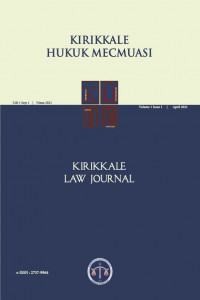TTK. M. 392’YE GÖRE BİLGİ ALMA HAKKININ KULLANILMASINDA YÖNETİM KURULU BAŞKANININ ROLÜ
TTK m. 392’de yönetim kurulu üyelerinin bilgi alma hakkı toplantı içinde ve toplantı dışında olmak üzere ayrıntılı bir şekilde düzenlenmiştir. Yönetim kurulu başkanı üyelerin bilgi alma hakkını kullanabilmesi için gerekli ortamı hazırlamalıdır. Zira başkan bilgi alma hakkının kullanımının garantörüdür. Özellikle eski TTK zamanında yaşanan sorunlar, TTK m. 392 ile giderilmek istenmiştir. Gerçekten de eski TTK zamanındaki “başkanın dediği olur” durumunun ortadan kaldırılması amaçlamıştır. Bu kapsasam yönetim kurulu üyesine toplantı içinde neredeyse sınırsız bir bilgi hakkı tanınmıştır. Bunun yanında toplantı dışında da, başkanın izniyle, üyenin bilgi alma hakkı düzenlenmiştir. Bu kapsamda başkanın izni önemlidir. Başkan tarafından izin verilirken nelerin dikkate alınması gerektiği ve hangi durumlardaizin verilmesinin reddedilebileceği tespit edilmelidir. Ayrıca toplantı dışında da başkanın bilgi alma hakkını kullanabilmesi için kurulun iznine ihtiyacı bulunmaktadır. Çalışmamızda bilgi alma hakkının kullanılması bakımında yönetim kurulu başkanının üstlendiği rolün üzerinde durulması amaçlanmıştır. Zira anonim şirketler uygulamasında TTK m. 392’den kaynaklı sorunların önemli bir bölümü, yönetim kurulu başkanının bu hakkı ihlâl etmesine dayanır.
Anahtar Kelimeler:
Bilgi alma hakkı, Yönetim kurulu başkanı, Yönetim kurulu üyesi, İnceleme hakkı
ROLE OF THE CHAIRPERSON OF THE BOARD OF DIRECTORS IN THE EXERCISE OF THE RIGHT TO REQUEST INFORMATION UNDER ARTICLE 392 OF THE TURKISH COMMERCIAL CODE
Article 392 of the Turkish Commercial Code regulates in detail the board members’ right to request information at the meetings and outside of the meetings. The chairperson of the board of directors must pave the way for the members to exercise their right to request information. This is because, the chairperson is the guarantor for the exercise of the right to request information. Article 392 of the Turkish Commercial Code aims to eliminate the problems experienced particularly in the period of the repealed Turkish Commercial Code. So indeed, it is aimed to eliminate the circumstance “what the chairperson says, goes” in the period of the repealed Turkish Commercial Code. This scope grants the board members almost an unlimited right to request information at the meetings. Besides, also outside of the meetings, the article regulates the members’ right to request information, upon the chairperson’s permission. Within this context, the chairperson’s permission is of importance. It must be determined what should be considered when granting the permission by the chairperson and in what cases the grant of the permission may be refused. Furthermore, the board’s permission is required in order for the chairperson to exercise the right to request information also outside of the meeting. Our study aims to dwell on the role played by the chairperson of the board of directors with regard to the exercise of the right to request information. This is because, in the practice of joint stock companies, a significant part of the problems originating from article 392 of the Turkish Commercial Code is based on the infringement of this right by the chairperson of the board of directors
Keywords:
Right to request information, Chairperson of the board of directors, Board member, Right to review,
___
- Bächtold Thomas Christian, Die Information des Verwaltungsrates, Insbesondere das Recht auf Auskunft und Einsicht gemäss OR Art. 715, Bern: Stämpfli, 1997.
- Bär Rolf, Wichtige Neuerungen im revidierten Aktienrecht, BN 53/1992, s. 391- 419.
- Böckli Peter, Die unentziehbaren Kernkompetenzen des verwaltungsrates, Züerich: Schulthess, 1994.
- Böckli Peter, Oberleitung mit mehr Profil, NZZ N. 18, 23.01.1992, s. 37.
- Böckli Peter, Schweizer Aktienrecht, Zürich-Basel-Genf, Schulthess, 2009.
- Druey Jean Nicolas, Das Informationsrecht des Outsiders, in Grundfragen des neuen Aktienrechts, Symposium Rolf Bär, Bern: Schulthess, 1993.
- Eren Fikret, Borçlar Hukuku Genel Hükümler, Ankara: Yetkin, 2012.
- Forstmoser Peter, “Die aktienrechtliche Verantwortlichkeit nach Schweizer Recht – Risiken und Möglichkeiten ihrer Vermeidung”, Liechtensteinische Juristenzeitung, 1/1984, s. 1-15.
- Grass Andrea R., Business Judgement Rule, Shranen der richterlichen Überprüfbarkeit von Management-Entscheidungen in aktienrechtlichen Verantwortlichkeitsprozessen, Zürich: Schulthess, 1998.
- Hungerbühler Iwo W., Der Verwaltungsratpräsident, Zürich: Schulthess, 2003.
- Kalender Emre, Anonim Şirket Yönetim Kurulu Üyelerinin Bilgi Alma Hakkı (TTK m. 392), Ankara: Yetkin Yayınevi, 2017.
- Kaya Arslan, Anonim Ortaklıkta Pay Sahibinin Bilgi Alma Hakkı, Ankara: BTHAE Yayınları, 2001
- Kırca İsmail, Şehirali Çelik Feyzan Hayal ve Manavgat Çağlar, Anonim Şirketler Hukuku C. I, Temel Kavram ve
- İlkeler, Kuruluş, Yönetim Kurulu, Ankara: BTHAE Yayınları 2013.
- Krneta Georg, Praxiskommentar Verwaltungsrat, Bern: Stämpfli, 2005.
- Kunz Peter Victor, “Die Auskunft- und Einsichtsrechte des Verwaltungsratsmitglieds”, AJP 5/1994, s. 572-580
- Müller Roland, ve Lipp Lorenz, Der Verwaltungsrat, Zürich: Schulthess, 1994.
- Plüss Adrian, Die Rechtsstellung des Verwaltungsratsmitgliedes, Zürich: Schulthess, 1990.
- Poroy Reha, Ünal Tekinalp ve Ersin Çamoğlu, Ortaklıklar ve Kooperatif Hukuku, İstanbul: Vedat Kitapçılık, 2009.
- Şener Oruç Hami, Teorik ve Uygulamalı Ortaklıklar Hukuku Ders Kitabı, Ankara, Seçkin Yayınevi, 2015.
- Waldburger Martin, Die Gleichbehandlung von Mitgliedern des Verwaltungsrates, Bamberg: Haupt, 2002.
- Wernli Martin ve Rizzi Marco, Basler Kommentar Obligationenrecht II, Basel. Helbing & Lichtenhahn, 2012.
- Wunderer Felix Rolf, Der Verwaltungsrats-Präsident, Aufgaben und Rollen in der Corporate Governance mittlerer bis grosser schweizerischer Publikumsgesellschaften, Zürich: Schulthess, 1995.
- Yayın Aralığı: Yılda 2 Sayı
- Başlangıç: 2021
- Yayıncı: Kırıkkale Üniversitesi
